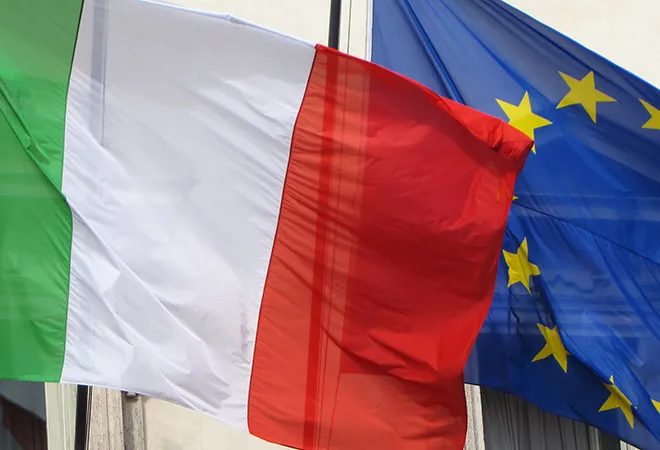
Exactly 100 years ago, Italy’s dictator Benito Mussolini carried out the March on Rome, cementing his National Fascist Party’s rule over Italy. Fast forward to September 2022, and Europe and the world watched as the continent’s first post-war far-right nationalist government was elected to power in its third largest economy and G-7 member, Italy.
Giorgi Meloni and her party, Brothers of Italy, with its neofascist roots in the post-war Italian Social Movement, emerged victorious, heading a three-party conservative right-wing coalition alongside Matteo Salvini’s League and former PM Silvio Berlusconi’s Forza Italia party.
Since 24
th February when Russia invaded Ukraine, Europe remained steadfast and united in its support for Ukraine and its strong opposition to Russia, passing package after package—a total of
eight rounds so far—of sanctions aimed to hurt the Russian economy and deplete Putin’s resources.
Memories of Hungary opposing the EU’s proposed embargo on Russian oil, where the EU was forced to dilute sanctions and eventually ban only shipment-borne Russian gas while allowing pipeline imports, are all too fresh.
However, when PM Mario Draghi’s government
collapsed in July in part because of his staunch policies towards Ukraine, it wasn’t just the Eurosceptic anti-establishment Five Star Movement led by former PM Giuseppe Conte (that fared
poorly in the current elections except in Italy’s South) and other right-wing opportunists that rejoiced, Putin probably celebrated as well. Draghi was the a chief architect of the sanctions regime owing to his sound
technocratic expertise and a strong advocate of supplying arms to Ukraine. His fall paved the way for snap elections where a right-wing alliance, replete with Putin fans, emerged victorious.
Anxiety in Brussels
Reminiscent of the country’s unstable and fragmented politics, Italy has had a whopping 69 ideologically diverse governments in 77 years since the Second World War. Yet the current government is Italy’s first far-right one since then.
While Putin rejoiced, Brussels became more apprehensive, and not without sufficient reason—Italy’s change of guard could have repercussions throughout Europe, particularly on the continent’s foreign policy. It could impact European cohesion and the outcome of policies towards the Russo-Ukrainian war, given the EU’s requirements for unanimous consensus across its 27 member states on measures such as sanctions. Memories
of Hungary opposing the EU’s proposed embargo on Russian oil, where the EU was forced to
dilute sanctions and eventually ban only shipment-borne Russian gas while allowing pipeline imports, are all too fresh.
Meloni, Italy’s first female Prime Minister, has deviated from her erstwhile populist Eurosceptic far-right image and the days when she
glorified Putin as a defender of ‘European values’. Instead, she has
painted herself as a moderate, pro-EU, pro-NATO Atlanticist and globalist, despite her party’s neo-fascist ideological roots and her professed
admiration for Hungary’s Viktor Orban. She has staunchly
supported Ukraine and all of Draghi and the EU’s policies so far, including the sanctions regime, the provision of arms, and the proposed European cap on gas prices. Even in the European Parliament, rather than the more extremist political factions, Meloni’s Brothers of Italy is
part of the centre-right European Conservatives and Reformists Group, which also
comprises the vehemently anti-Putin but right-wing Polish Law and Justice Party.
Meloni, Italy’s first female Prime Minister, has deviated from her erstwhile populist Eurosceptic far-right image and the days when she glorified Putin as a defender of ‘European values’.
Thus, rather than Meloni, it is her coalition partners who could be the weak link in the West’s response to Ukraine. Both Salvini and former PM Berlusconi have historically had
cosy relationships with the Kremlin alongside contempt for Brussels. Salvini has gone so far as to publicly
adorn t-shirts with Putin’s face emblazoned, while the Berlusconi-Putin ‘bromance’ is well-known—Berlusconi
referred to Putin as “the best statesman currently on Earth” and even bizarrely
named a bed in his house after the Russian autocrat. Despite assuring support for Ukraine, both have
criticised western sanctions on Russia, highlighting how they hurt Europeans more than Russia.
Italian public opinion complicates foreign policy
Even if the three coalition partners manage to converge and maintain support for EU foreign policy on Ukraine as
pledged in their coalition programme, the compulsions of democratic politics mean that their decisions will have to factor in public opinion—something Putin rarely has to contend with in his political career.
Already, Italy
remains one of the most pro-Russia countries in Europe, with strong economic and cultural ties between the two. This pro-Russian sentiment is traced back to the days of the Cold War when Western Europe’s largest Communist Party was in Italy, and when Italy barely perceived Russia as a threat.
A
survey by the European Council on Foreign Relations presents some stark facts— amongst European member states, Italians are the least convinced that Russia is to blame for the war, with only 56 percent blaming Russia. More Italians, than any other European nationality surveyed, are
against sending additional military equipment and arms to Ukraine. And at least 51 percent of Italian voters would like to
end sanctions on Russia because of their impact on the cost of living in Europe.
The International Monetary Fund (IMF) estimates the impact of a Russian gas ban to result in a 5 percent economic contraction in Italy, given the country’s dominance of gas in its energy mix and its over 40 percent dependency on Russian gas previously.
Draghi has swiftly struck new energy partnerships through
gas deals with Algeria, Angola, and the Republic of Congo, while pivoting towards more coal and renewables. Yet, the International Monetary Fund (IMF) estimates the impact of a Russian gas ban to result in a 5 percent economic
contraction in Italy, given the country’s dominance of gas in its energy mix and its over 40 percent
dependency on Russian gas previously.
Thus, keeping the Italian people on board will be challenging at a time of soaring inflation, record high energy prices, increasing cost of living, and high debt. This probably also explains why, despite the ongoing war, 63 percent of Italians
do not want to see an increase in their government’s defence spending.
More continuity, less change
Even though intra-government divergences will challenge Meloni’s leadership, Italy’s posture towards the war is unlikely to change. Instead, on this specific issue, Rome will continue to stay the course and broadly align with Brussels and NATO, despite the caveats outlined above.
After all, this isn’t the first time that coalition partners in Italy’s government have expressed opposition to sanctions on Russia—even in 2018 when the League and Five Star Movement were in power, they wanted to
relax the Crimea annexation-related sanctions on Russia but finally did not do so. Even now, despite the warm nature of their ties with Putin, all three coalition partners
voted in favour of Finland and Sweden’s NATO membership. As analyst Emanuele Scimia
points out, “every new Italian administration tends to align with the US And NATO”. Professor Maurizio Cotta, University of Siena,
reiterates that “Italians are very scared of being alone in the continent”.
The problems facing Hungary and Poland’s access to EU funds because of democratic backsliding and rule of law of issues are all too well-known.
Besides, the Commission
plans to give Italy 200 billion euros in economic relief funds—the largest payout allocated to a member state as part of the 800 billion euros
NextGenerationEU plan to aid economic recovery from the pandemic. However, the funds, referred to as
“tools” by European Commission President Ursula von der Leyen against pro-Putin oriented rebellion within Europe, are conditional on Italy’s compliance with reform
commitments. The amount should be incentive enough to cooperate and which no government, irrespective of ideology, would like to squander away given the struggling state of the Italian economy with its
150 percent debt-to-GDP ratio. The
problems facing
Hungary and Poland’s access to EU funds because of democratic backsliding and rule of law of issues are all too well-known. Therefore, managing the country’s energy and economic crises would likely take precedence over sparring with the EU on whom Italy is heavily economically dependent.
However, to expect the new government to be as hawkish on Russia as Draghi would be misplaced. On the two previously vocalised points of divergence—additional sanctions on Russia and the provision of arms to Ukraine—the government could kick up a fuss and complicate matters, at the very least to have some bargaining chips with Brussels on policy relating to other contentious issues like immigration.
Of course, all of this is contingent on the government actually surviving in the first place, given the scandalous, fragile and overtly opportunistic nature of Italian politics and the fissures within this coalition. Meloni has the advantage of her party winning the largest majority in the elections, garnering 26 percent of the
vote compared to less than 9 percent received by her partners, but she will have to compromise with the various positions of her coalition allies, who may attempt to weaken her, and therein could brew trouble. And yet, even in Meloni’s case, time will tell if her toned-down rhetoric on Russia was genuine or merely an electoral strategy to differentiate herself from her opponents, after which she reverts to her pre-election Putin-lauding self.
For now, fears that European solidarity on Russia would crumble because of the new Italian coalition coming to power may be exaggerated, though not unfounded. The distance between Rome and Brussels, at least on foreign policy towards Russia and the war, is unlikely to widen. As Europe faces its greatest continental turmoil since the Cold War, Draghi’s pro-Ukraine legacy will likely survive in Italy, albeit minus the respect that a Draghi-governed Italy garnered on the European stage.
The views expressed above belong to the author(s). ORF research and analyses now available on Telegram! Click here to access our curated content — blogs, longforms and interviews.



 Exactly 100 years ago, Italy’s dictator Benito Mussolini carried out the March on Rome, cementing his National Fascist Party’s rule over Italy. Fast forward to September 2022, and Europe and the world watched as the continent’s first post-war far-right nationalist government was elected to power in its third largest economy and G-7 member, Italy.
Giorgi Meloni and her party, Brothers of Italy, with its neofascist roots in the post-war Italian Social Movement, emerged victorious, heading a three-party conservative right-wing coalition alongside Matteo Salvini’s League and former PM Silvio Berlusconi’s Forza Italia party.
Since 24th February when Russia invaded Ukraine, Europe remained steadfast and united in its support for Ukraine and its strong opposition to Russia, passing package after package—a total of
Exactly 100 years ago, Italy’s dictator Benito Mussolini carried out the March on Rome, cementing his National Fascist Party’s rule over Italy. Fast forward to September 2022, and Europe and the world watched as the continent’s first post-war far-right nationalist government was elected to power in its third largest economy and G-7 member, Italy.
Giorgi Meloni and her party, Brothers of Italy, with its neofascist roots in the post-war Italian Social Movement, emerged victorious, heading a three-party conservative right-wing coalition alongside Matteo Salvini’s League and former PM Silvio Berlusconi’s Forza Italia party.
Since 24th February when Russia invaded Ukraine, Europe remained steadfast and united in its support for Ukraine and its strong opposition to Russia, passing package after package—a total of  PREV
PREV


